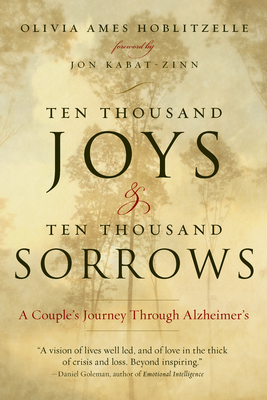 If you are one of the 29 million people in the United States touched by Alzheimer’s you will want to read this book, Ten Thousand Joys & Ten Thousand Sorrows: A Couple’s Journey Through Alzheimer’s by Olivia Ames Hoblitzelle. It is a beautifully written memoir with practical guidance for family members and friends of those afflicted with this condition.
If you are one of the 29 million people in the United States touched by Alzheimer’s you will want to read this book, Ten Thousand Joys & Ten Thousand Sorrows: A Couple’s Journey Through Alzheimer’s by Olivia Ames Hoblitzelle. It is a beautifully written memoir with practical guidance for family members and friends of those afflicted with this condition.
“Hob” was 72 when he was diagnosed with Alzheimer’s, a relatively young age. A dear friend of mine was diagnosed at 60, a devastatingly young age. I’m reminded of what Bette Davis said, “Old age ain’t no place for sissies.”
This disease, perhaps like no other, makes it clear that aging is inevitable and that our sense of control over things has been a comforting illusion, perhaps even delusion. It reminds us as Hoblitzelle says that, “We all live on the edge of the unknown. Maybe even on the edge of an abyss.”
Olivia and Hob were married for 33 years when the diagnosis arrived. Perhaps we all fear losing our minds in this way, and reading about this couple’s journey can give us tools and confidence to navigate that journey should it become necessary in our lives. And much inspiration and practical guidance at the end of each chapter if you are going through the journey now.
They committed themselves to making the journey a spiritual one. Both had a longstanding relationship with Buddhist practice. “Determined to live the experience consciously and lovingly, we regarded this–the final challenge of our relationship–as an opportunity for opening to the unknown, for learning, and, above all, for deepening in love.”
This is a tale of courage, grace, and humanity — at its most essential. It’s a deeply personal account of the range of emotions that arose in this process from the initial shock, “I felt like an animal wounded by an invisible arrow, but I couldn’t find the place where it had hit,” to loss, “grief wrapped me in a finely woven cocoon to protect me from the enormity of loss.”
This is also a good introduction or deepening of familiarity with the teachings of the Buddha — the dharma — that has nothing but relevance for these circumstances. It’s a call to mindfulness, a gentle vigilance that helps her to cope with grace.
Never knowing what would confront her in the early days of Hob’s illness, Olivia would invoke mindfulness before entering the home:
I shifted into mindfulness practice: Walking and breathing mindfully, aware of each step, each breath. Just before the door, I repeated a simple metta, or loving-kindess prayer. That was how I steadied myself in preparation for the inevitable–the latest crisis waiting for me on the other side of the door.
There are many lessons available here. Cultivating the six perfections (patience, generosity, discipline, diligence, contemplation, and wisdom), being wholehearted in everything you do, using hardships as the means for spiritual growth and equanimity.
This book is a powerful reminder on how to transform adversity into blessing. Hob’s attitude is a testament to human adaptability and I’ll leave you with his words:
If you want to be entertained by your own downfall, better to do it knowingly than get all choked up the inevitable. I can feel the slipping; it’s like having quicksand under me. Sometimes if I don’t say something right away, it’s like a wild bird. it’s gone. it’s delicate, this business of memory and words.
This blog entry is dedicated to my friend Ed as he moves along on his journey with Alzheimer’s.

